Thymus, ThymeSerpyllum, Mother of ThymeMother of Thyme: Serpillum, Quendel–Ajagandha (Ayurveda) –Hasha, Jangali Pudina (Unani) |

|
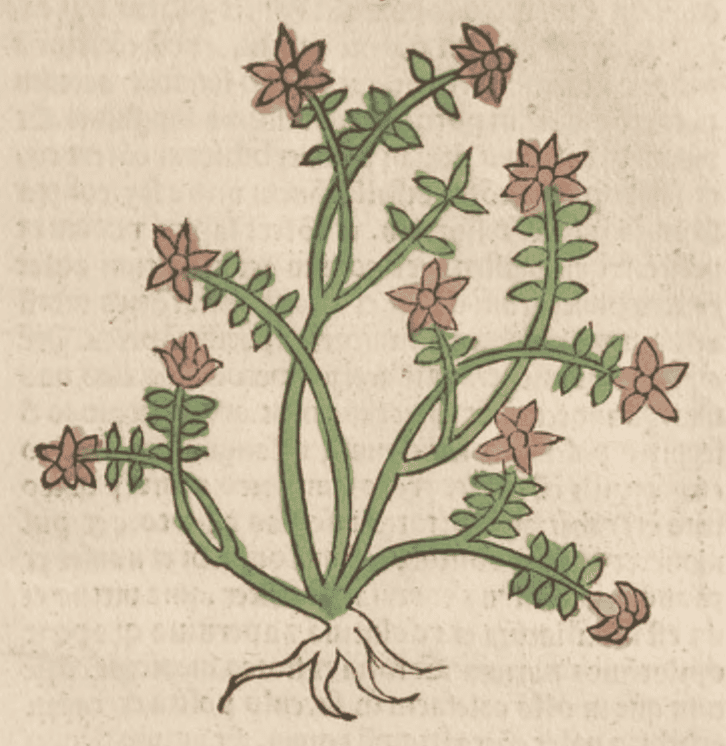 Herbarius latinus, Petri, 1485
Herbarius latinus, Petri, 1485
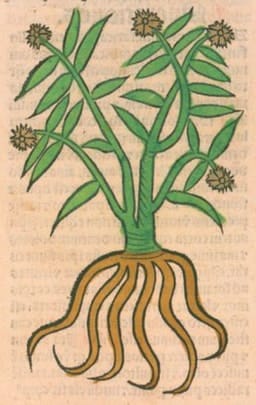 Thyme
ThymeOrtus Sanitatis, Meydenbach, 1491 |
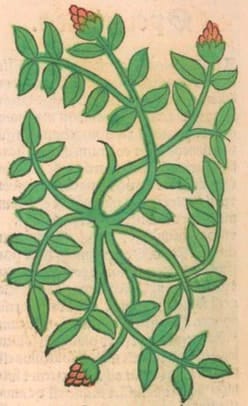 Serpyllum
SerpyllumOrtus Sanitatis, Meydenbach, 1491 |
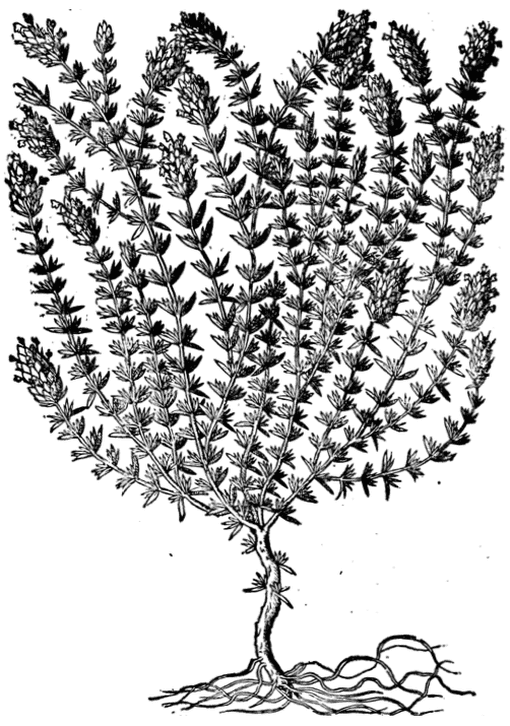
|
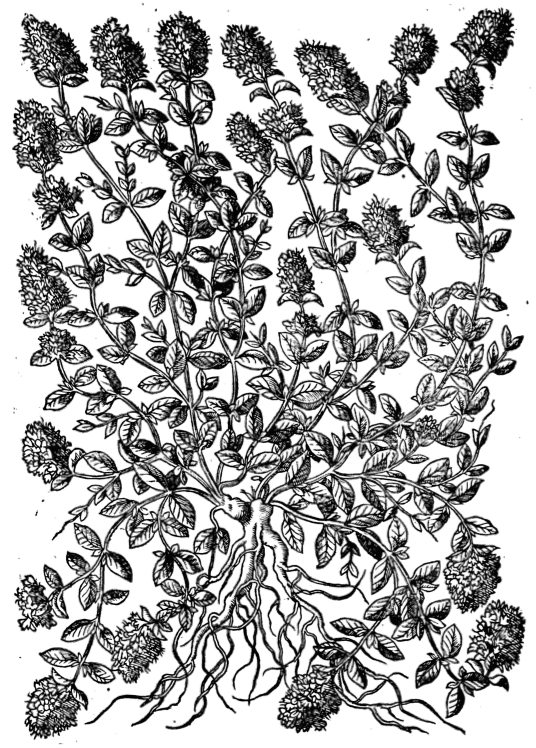
|
New Kreuterbuch, Matthiolus, 1563
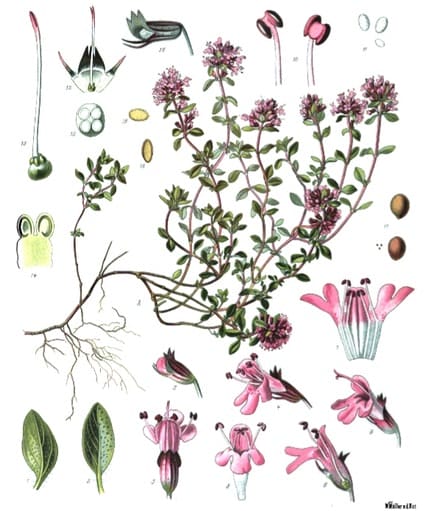 Thyme
ThymeKoehler’s Medizinal Pflanzen, 1887
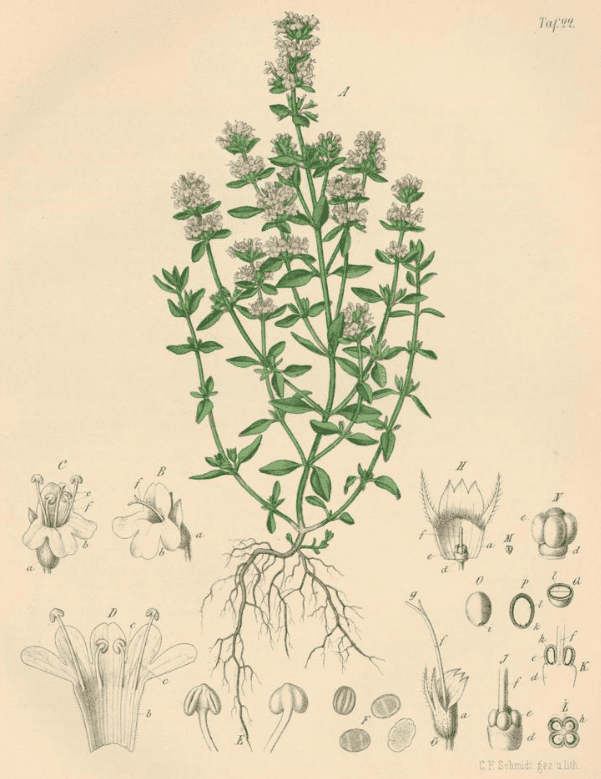
|
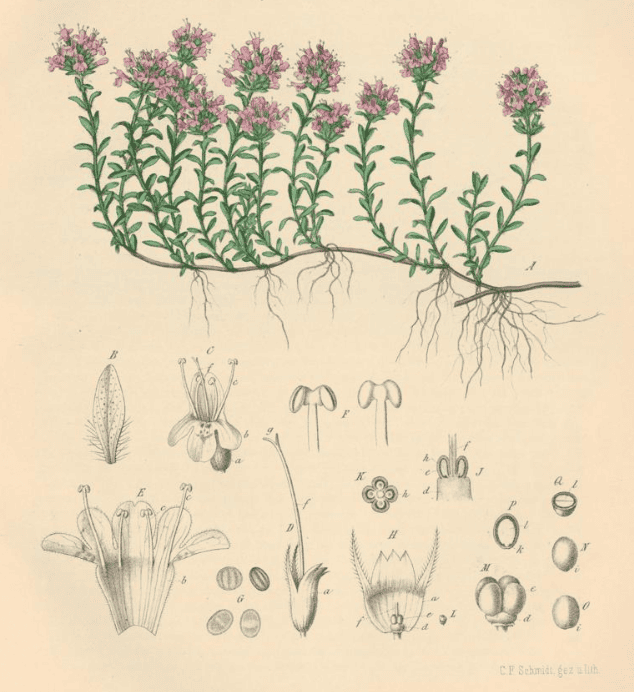
|
(Atlas der Officinellen Pflanzen, Berg & Schmidt, Leipzig, 1893)
Botanical name:
Thymus spp.
- T. vulgaris: Thyme
- T. serpyllum: Mother of Thyme
Lemon-scented Thyme was sometimes called for.
Parts used:
Whole Herb
Temperature & Taste:
Warm, dry. Pungent
Wild Thyme is “Hot and Dry up to the Third degree”. (Avicenna)
Classifications:
2A APERIENT. 2D ATTENUATERS OF CONGEALED BLOOD. 2J. RAREFYING
3G. EMMENAGOGUE. 3K. EXPECTORANT
4f. SPLENETIC. 4i. UTERINE. 4j. NERVINE
Preparers and Purgers of Melancholy
Uses:
1. Clears Wind-Cold, Resists Poison, Promotes Sweat:
-prevents and treats acute infectious and epidemic disease including Colds, Flu
-Cough due to Wind and Cold
-acute infections of the Lungs, Urinary system, or digestive system.
-various poisons, including the bites of Venomous Beasts.
2. Clears Cold Phlegm, Benefits the Lungs, Stops Cough and Wheezing:
-irritable and spasmodic Coughs, including that of Whooping Cough, acute or chronic Bronchitis
-Asthma, Emphysema, shortness of Breath, Chest pain
-swollen, sore Throat (West, TCM)
–Culpeper said ‘a strengthener of the Lungs, as notable a one as grows’.
–Gerard said to drink with vinegar and salt to purge phlegm;
-boiled in Honey and Water for a ‘hard and painful Cough’.
-Hemoptysis
3. Calms the Mind, Clears Wind, Stops Spasms:
-Headache, Dizziness, Fearfulness, Melancholy and Epilepsy.
-especially useful for Nightmares.
-Sciatica and chronic pains of the Head. The flowers have also been used as a stimulant in Lethargy.
-painful, watering and bleariness of the Eyes; Dioscorides said when used in food it helps dimness of sight.
–Culpeper said Wild Thyme was good for ‘Frenzy or Lethargy, although they are two contrary diseases’.
–Paralysis, Facial Paralysis, Amnesia, Tetanus and Epilepsy when taken with Honey. (Unani)
-Toothache, Headache, general aching and pain, Pruritus etc. (TCM)
4. Prepares Melancholy:
-Thyme was often used for Melancholy, both of the Mind, but also to help purge the Melancholy Humor.
–Galen said it eradicated Melancholy or any other humor from the Spleen
5. Warms the Uterus, Moves the Blood, Promotes Menstruation:
-promotes menstruation when obstructed by cold, or congealed blood
–Promotes birth, cleanses the Afterbirth, and expels a Dead Child.
-leukorrhea from cold and damp, as well as frigidity.
6. Warms the Stomach, Clears Cold:
-Colic, Dyspepsia, and against gastric fermentation;
-Diarrhea, Gastroenteritis
-Abdominal Pain, Abdominal Cramps, and Vomiting from cold. (TCM, West)
7. Clears Damp, Promotes Urine:
-obstructed Urine (Unani)
8. Kills Worms:
-Hookworm, Tapeworm, but also Thread, and Roundworms. (Oil is best)
9. Externally:
Clears Poison, Eases Pain, Reduces swelling:
-applied to Abscess, Swellings, Warts, Eczema, Psoriasis, Ringworm and roughness of the Skin
-beaten with vinegar and applied to Warts: “It dissolves Warts”. (Avicenna)
–Hildegard used it for Leprosy.
-joint pain, Gout, and Sciatica
-wash or bath for Paralytic or Wasting Limbs
-topically for pain and swelling of the Liver or Spleen
-applied to swollen Testicles.
-bruised with vinegar and applied over bruising and blood clots (Unani)
-topically for Hair loss and Alopecia (with vinegar)
-mouthwash for pain and swelling of the Teeth and Gums.
-repels Mosquitoes
Dose:
Powder: 1–3 grams
Decoction: 3–6 (up to 9) grams (added towards the end)
Substitutes:
1. In general, Thyme and Mother of Thyme can replace one another, with the latter regarded as stronger.
2. Zataria multiflora is used in Unani medicine, its use being synonymous with Mother of Thyme.
Main Combinations:
Anise & Thyme
1. Thyme is very often combined with Aniseed for 2 totally separate functions:
i. used for Cold-Phlegm and acute Wind-Cold Coughs, Bronchitis, Asthma etc., Thyme with Aniseed, Licorice, Coltsfoot, Plantain etc.
ii. used for Spleen Damp and Melancholy, Thyme with Aniseed, Dodder, Polypody etc
2. Acute Sore Throat:
i. Thyme with Sage as a gargle
ii. Thyme with Marshmallow, Fennel and Aniseed
iii. Thyme with Camomile, Sage and Licorice
3. Cough:
i. “If taken as a decoction or lincture with honey, it removes congestion from the Chest and Lungs, helps in expectoration“. (Avicenna)
ii. Thyme with Licorice (Formulaire Pharmaceutitique a l’usage des Hospitaux Militaires de France, 1821)
iii. in infants, Thyme with Fennel seed, Plantain, Mullein, Mallow leaf and Balm
iv. Cold Cough, Thyme with Horehound, Rue, Hyssop, Pennyroyal, Aniseed (as in Decoction for Cold Coughs of Nicholas)
v. Thyme with Coltsfoot, Yarrow and Marshmallow
4. Whooping Cough:
i. Thyme with Raisin, Licorice
ii. Thyme with Hyssop and Licorice
iii. Thyme with Cowslip, Sundew (Meyer)
iv. Thyme with Plantain, Cowslip root and Fennel seed
v. Thyme with Fennel, Elder flower and Agrimony (German monastic formula)
5. Bronchitis:
i. Thyme with Elecampane, Nettle leaf, Lungwort (Fischer)
ii. Thyme with Licorice, Mallow flowers, Thyme, Aniseed
6. Asthma and Bronchitis, Thyme with Licorice, Ephedra and Almond (TCM)
7. Hemoptysis, Wild Thyme is decocted in Vinegar and Honey and taken. (The Secrets of Alexis, 1615)
8. Promote Menstruation:
i. Thyme with Rue, Centuary, Maidenhair and Oregano (Secrets of Art and Nature)
ii. Mother of Thyme with Motherwort, Pennyroyal, Mugwort, Southernwood, Balm, Vervain (as in Decoction for the Womb)
9. Nightmares:
i. Thyme with Camomile
ii. Thyme with Balm
10. Abscess, Thyme with Mother of Thyme, Linseed and Fenugreek, made into a paste and applied
11. Bath for Rheumatism and to strengthen, essential oils of Thyme, Oregano, Rosemary, Lavender diluted in spirit (Leclerc)
Major Formulas:
Decoction of Thyme
Decoction of Thyme (Mesue)
Decoction of Thyme of Andernacus
Decoction of Parsley and Thyme
Decoction for Chlorosis
Decoction for Cold Coughs (Nicolas Myrepsus)
Decoction for the Womb
Syrup of Betony (Pharmacopoeia Augustana)
Syrup of Horehound (Fernelius)
Powder of Three Peppers (Diatrion Piperion) (Mesue)
Electuary of Hyssop (Diahyssopus) (Nicholas)
Indian Pills (Mesue)
Cautions:
1. Not used in full doses during Pregnancy
Main Preparations used:
Distilled Water of the flowering Herb, Spirit, Distilled Oil, Tincture of Lemon Thyme
1. Distilled Water of Thyme or Mother of Thyme:
i. Thyme in flower (1 part), Water (4 parts). Distil half. Sometimes it is re-distilled from fresh herb.
2. Spirit of Thyme or Mother of Thyme:
i. Flowering Thyme (1 part), Alcohol (4–6 parts). After 3 days, distill half.
3. Compound Spirit of Wild Thyme:
i. Wild Thyme in flower (2 lbs.), Savory, Thyme, Camomile (2 oz. each), Cinnamon, Mace (½ oz. each), White Wine (18 lbs.). Digest 2 days, distil slowly 8 pounds. (Pharmacopoeia Wirtembergica, 1798)
ii. Wild Thyme in flower (4 handfuls), Camomile, Savory, Thyme (1 handful each), Wine (6 lbs.) Macerate 3 days, distil half. Infuse in Calamus, Cassia Lignea, Cinnamon, Mace (½ oz. each). (Pharmacopoeia Sardoa, 1773)
-
Extra Info
- Research
